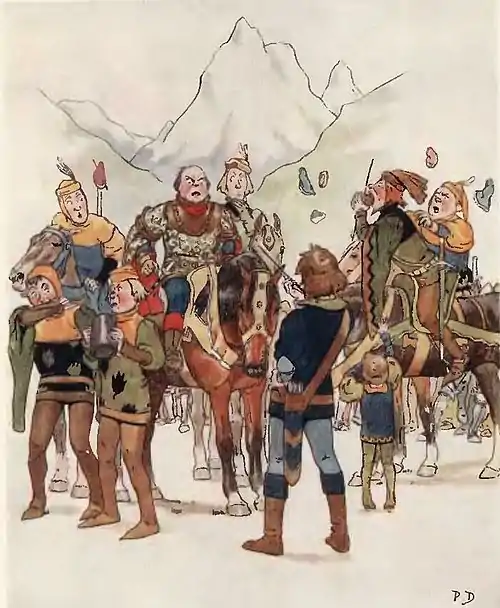CHAPTER XII
The crowd fell back, leaving a lane down which Walter walked, carrying the apple. There was dead silence as he passed. Then the people began to whisper excitedly to one another.
“Shall this be done before our eyes?” said Arnold of Melchthal to Werner Stauffacher. “Of what use was it that we swore an oath to rebel if we permit this? Let us rise and slay the tyrant.”
Werner Stauffacher, prudent man, scratched his chin thoughtfully.
“We-e-ll," he said, “you see, the difficulty is that we are not armed and the soldiers are. There is nothing I should enjoy more than slaying the tyrant, only I have an idea that the tyrant would slay us. You see my point?"
“Why were we so slow!" groaned Arnold. “We should have risen before, and then this would never have happened. Who was it that advised us to delay?”
“We-e-ll," said Stauffacher (who had himself advised delay), “I can't quite remember at the moment, but I dare say you could find out by looking up the minutes of our last meeting. I know the motion was carried by a majority of two votes. See! Gessler grows impatient."
Gessler, who had been fidgeting on his horse for some time, now spoke again, urging Tell to hurry.
“Begin!” he cried—“begin!”
“Immediately,” replied Tell, fitting the arrow to the string.
Gessler began to mock him once more.
“You see now,” he said, “the danger of carrying arms. I don’t know if you have ever noticed it, but arrows very often recoil on the man who carries them. The only man who has any business to possess a weapon is the ruler of a country—myself, for instance. A low, common fellow—if you will excuse the description—like yourself only grows proud through being armed, and so offends those above him. But, of course, it’s no business of mine. I am only telling you what I think about it. Personally, I like to encourage my subjects to shoot; that is why I am giving you such a splendid mark to shoot at. You see, Tell?"
Tell did not reply. He raised his bow and pointed it. There was a stir of excitement in the crowd, more particularly in that part of the crowd which stood on his right, for, his hand trembling for the first time in his life, Tell had pointed his arrow, not at his son, but straight into the heart of the crowd.
“Here! Hi! That's the wrong way! More to the left!” shouted the people in a panic, while Gessler roared with laughter, and bade Tell shoot and chance it.
“If you can't hit the apple or your son,” he chuckled, “you can bring down one of your dear fellow-countrymen."
Tell lowered his bow, and a sigh of relief went through the crowd.
“My eyes are swimming,” he said; “I cannot see."
Then he turned to the Governor.
"I cannot shoot.” he said; “bid your soldiers kill me.”
“No," said Gessler—“no, Tell. That is not at all what I want. If I had wished my soldiers to kill you, I should not have waited for a formal invitation from you. I have no desire to see you slain. Not at present. I wish to see you shoot. Come, Tell, they say you can do everything, and are afraid of nothing. Only the other day, I hear, you carried a man, one Baumgartner—that was his name, I think—across a rough sea in an open boat. You may remember it? I particularly wished to catch Baumgartner, Tell. Now, this is a feat which calls for much less courage. Simply to shoot an apple off a boy’s head. A child could do it.”
While he was speaking, Tell had been standing in silence, his hands trembling and his eyes fixed, sometimes on the Governor, sometimes on the sky. He now seized his quiver, and taking from it a second arrow, placed it in his belt. Gessler watched him, but said nothing.
“Shoot, father!” cried Walter from the other end of the lane; “I'm not afraid.”
PLATE XIII. But, as the arrow cleft the core, |
|
Tell, calm again now, raised his bow and took a steady aim. Everybody craned forward, the front ranks in vain telling those behind that there was nothing to be gained by pushing. Gessler bent over his horse's neck and peered eagerly towards Walter. A great hush fell on all as Tell released the string.
“Phut!” went the string, and the arrow rushed through the air.
A moment’s suspense, and then a terrific cheer rose from the spectators.
The apple had leaped from Walter’s head, pierced through the centre.
